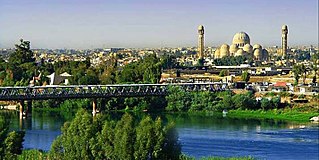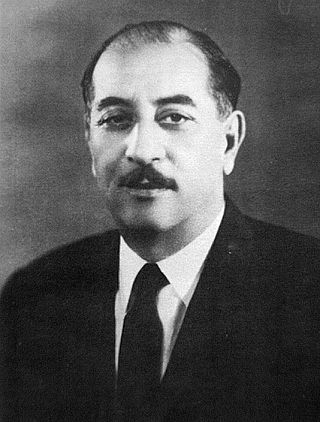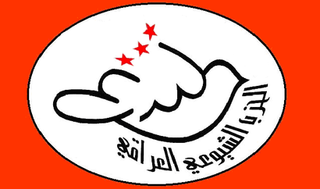Related Research Articles
Iraq is a federal parliamentary representative democratic republic. It is a multi-party system whereby the executive power is exercised by the Prime Minister of the Council of Ministers as the head of government, the President of Iraq as the head of state, and legislative power is vested in the Council of Representatives.

The Patriotic Union of Kurdistan is a political party active in Kurdistan Region and the disputed territories in Iraq. The PUK describes its goals as self-determination, human rights, democracy and peace for the Kurdish people of Kurdistan and Iraq. The PUK is currently under the leadership of Bafel Talabani. The PUK was founded in 1975 by Jalal Talabani, Nawshirwan Mustafa, Fuad Masum, Adel Murad, Ali Askari and Abdul Razaq Feyli. All presidents of Iraq under the 2005 constitution have been from this party.

The Arab Socialist Baʿth Party was a political party founded in Syria by Mishel ʿAflaq, Ṣalāḥ al-Dīn al-Bīṭār, and associates of Zakī al-ʾArsūzī. The party espoused Baʿathism, which is an ideology mixing Arab nationalist, pan-Arab, Arab socialist, and anti-imperialist interests. Baʿthism calls for unification of the Arab world into a single state. Its motto, "Unity, Liberty, Socialism", refers to Arab unity, and freedom from non-Arab control and interference.

Nineveh or Ninawa Governorate is a governorate in northern Iraq. It has an area of 37,323 km2 (14,410 sq mi) and an estimated population of 2,453,000 people as of 2003. Its largest city and provincial capital is Mosul, which lies across the Tigris river from the ruins of ancient Nineveh. Before 1976, it was called Mosul Province and included the present-day Dohuk Governorate. The second largest city is Tal Afar, which has an almost exclusively Turkmen population.

Ahmed Hassan al-Bakr was an Iraqi politician who served as the fourth president of Iraq, from 17 July 1968 to 16 July 1979. He was a leading member of the revolutionary Arab Socialist Ba'ath Party and later the Baghdad-based Ba'ath Party and its regional organisation Ba'ath Party – Iraq Region, which espoused Ba'athism, a mix of Arab nationalism and Arab socialism.

Ibrahim Abd al-Karim al-Eshaiker, also known as Ibrahim al-Jaafari, is an Iraqi politician who was Prime Minister of Iraq in the Iraqi Transitional Government from 2005 to 2006, following the January 2005 election. He served as Minister of Foreign Affairs from 2014 to 2018.
The Law of Administration for the State of Iraq for the Transitional Period, also called the Transitional Administrative Law or TAL, was Iraq's provisional constitution following the 2003 Iraq War. It was signed on March 8, 2004 by the Iraqi Governing Council. It came into effect on June 28, 2004 following the official transfer of power from the Coalition Provisional Authority to a sovereign Iraqi government. The law remained in effect until the formation of the government in May 2006, when it was superseded by the permanent constitution that had been approved by referendum on October 15, 2005.

The Iraqi Communist Party is a communist party and the oldest active party in Iraq. Since its foundation in 1934, it has dominated the left in Iraqi politics. It played a prominent role in shaping the political history of Iraq between its foundation and the 1970s. The Party was involved in many of the most important national uprisings and demonstrations of the 1940s and 1950s. It suffered heavily under the Ba'ath Party and Saddam Hussein but remained an important element of the Iraqi opposition and was a vocal opponent of the United Nations sanctions imposed on Iraq after the Gulf War of 1991. It opposed the United States invasion of Iraq in 2003 but since then has participated in the new political institutions. It received little support in the Iraqi general elections of 2005. The party gained some seats in each province in which the 2013 Iraqi governorate elections were held.

Parliamentary elections were held in Iraq on 30 January 2005 to elect the new National Assembly, alongside governorate elections and a parliamentary election in Kurdistan Region. The 275-member legislature had been created under the Transitional Law during the international occupation. The newly elected body was given a mandate to write a new constitution and exercise legislative functions until the new constitution came into effect. The elections also led to the formation of the Iraqi Transitional Government.

The Council of Representatives, usually referred to simply as the Parliament, is the unicameral legislature of the Republic of Iraq. According to the Constitution of Iraq, it is the lower house of the bicameral legislature of the country. As of 2020, it comprises 329 seats and meets in Baghdad inside the Green Zone.

The Iraqi Turkmen Front is a political movement representing the Iraqi Turkmen people. It was founded on April 5, 1995 as a coalition of several Turkmen parties operating within the framework of Iraq's unity. The party aims for the Turkmen community to have greater political involvement, increased recognition and more rights.
The presidency council of Iraq was an entity that operated under the auspices of the "transitional provisions" of the Constitution of Iraq and previously under the Transitional Administrative Law.
The Constitution of the Republic of Iraq is the fundamental law of Iraq. The first constitution came into force in 1925. The current constitution was adopted on September 18, 2005 by the Transitional National Assembly of Iraq, and confirmed by constitutional referendum, held on October 15, 2005. It was published on December 28, 2005 in the Official Gazette of Iraq, in Arabic original, and thus came into force. An official translation into English for international use was produced in cooperation between Iraqi state authorities and the United Nations' Office for Constitutional Support. Since 2006, several proposals for adoption of various constitutional amendments were initiated. The Kurdish language is official at state level.
Kurdistan Islamic Union, colloquially referred to as Yekgirtû, is an Islamist party in Iraqi Kurdistan.

Governorate council elections were held in Iraq on 30 January 2005, the same day as the elections for the transitional Iraqi National Assembly. Each province has a 41-member council, except for Baghdad, whose council has 51 members.

The Parliament of Kurdistan, also called the Kurdish Parliament (IKP), is the parliament of the Kurdistan Region of Iraq. It is made up of representatives from the various parties, lists or slates that are elected every four years by the inhabitants of the provinces of Kurdistan Region currently governed by the Kurdistan Regional Government. In 2009 an amendment was applied to the Kurdistan Election Law of the year 1992, and since then the body was referred to as Kurdish Parliament instead of its previous name the Kurdish National Assembly.
The federal government of Iraq is defined under the current Constitution, approved in 2005, as an Islamic, democratic, federal parliamentary republic. The federal government is composed of the executive, legislative, and judicial branches, as well as numerous independent commissions.

Jan Arild Ellingsen is a Norwegian politician for the Progress Party.

The Jordanian Arab Socialist Ba'ath Party (JASBP), previously known as the Arab Socialist Ba'ath Party – Jordan Region is a political party in Jordan. It is the Jordanian regional branch of the Iraqi-led Ba'ath Party.
Abdullah Sallum al-Samarra'i was an Iraqi Ba'athist politician and leading member of the Arab Socialist Ba'ath Party in Iraq. He was a member of the Regional Command from 1964 to 1970, when he was expelled.
References
- ↑ "Council of Representatives Elections December 15 /2005" (PDF). The Independent Electoral Commission of Iraq. Retrieved 2 April 2011.[ permanent dead link ]